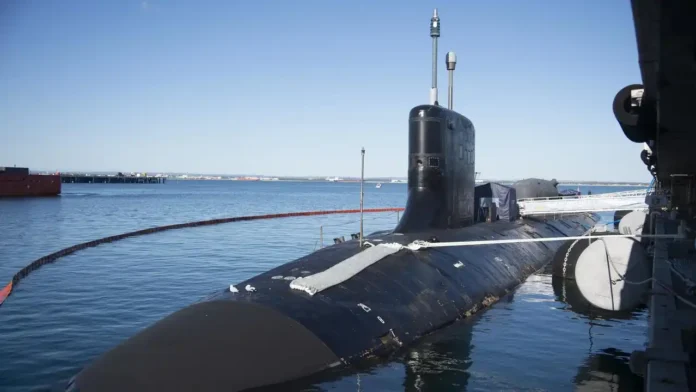Reductions in the manufacturing of a nuclear-powered submarine in the US have sparked worries in Australia regarding its intended procurement, while the government progresses in regulating its nuclear sector.
The proposed US defense budget for 2025 has excluded a Virginia-class submarine.
Australia is poised to purchase at least three, potentially five, second-hand Virginia-class submarines from the US in the early 2030s, leading to apprehensions that reductions in production could impede Canberra’s acquisition plans.
Despite this, Defense Minister Richard Marles affirmed the continued commitment of Australia, Britain, and America to the AUKUS pact, ensuring the delivery of the submarines.

All three AUKUS partners are swiftly collaborating to merge our industrial bases and bring to fruition this historic initiative among our nations,” he remarked.
US President Joe Biden’s budget proposal for 2025 also allocates $11 billion for further investment over the next five years in the domestic submarine industry.
Australia will contribute $3 billion to enhance production rates in the US submarine industry.
Former Australian Prime Minister Malcolm Turnbull emphasized that Australia relied entirely on Washington to procure submarines, and America would prioritize its own navy in case of production shortages.
“The fact is, the Americans won’t exacerbate their submarine shortfall by providing or selling submarines to Australia, and the AUKUS legislation establishes that,” he stated on ABC radio on Wednesday.
“We are essentially at the mercy of American politics.
“The truth is, unless the Americans can significantly accelerate submarine production, and there’s little indication they can, we won’t receive the submarines as promised.

Opposition Leader Peter Dutton acknowledged that the AUKUS pact, crucial for Australia’s military future, would encounter challenges and fluctuations.
“But these challenges will be resolved because, ultimately, our unity as three nations makes us stronger than if we were divided,” he affirmed.
According to Michael McCord, the US defense under secretary comptroller and chief financial officer, Virginia-class submarines scheduled for delivery this year in America were facing delays averaging more than 30 months. He also identified insufficient funds reaching the industrial base as a problem, with over a dozen submarines on order still in production.
Mr. McCord suggested that investing money to support the industry rather than allocating it to procure another submarine would be a wiser investment, as the US aimed to increase the production rate to two submarines annually.
Certain rank-and-file members of the Labor Party have opposed the AUKUS agreement, questioning the rationale behind sending billions of dollars to bolster the US production line. Labor Against War labeled the US budget cut to the Virginia-class submarines as a “potentially devastating blow to AUKUS.

The Royal Institution of Naval Architects emphasized the necessity for clarity regarding the role of an independent nuclear watchdog in Australia, particularly concerning the acquisition of technology from the US.
Robin Gehling, the secretary of the Australian division, highlighted the importance of clarity, especially in cases where overseas construction is involved in the section of the submarine housing the nuclear reactor.
“It is crucial to delineate where the jurisdiction of the regulator begins along this supply chain,” he stated during a parliamentary hearing evaluating Australia’s regulatory framework for nuclear technology on Wednesday.


